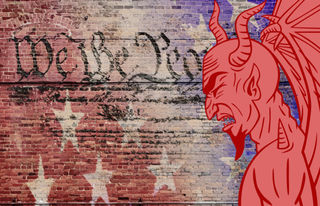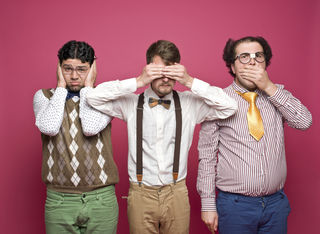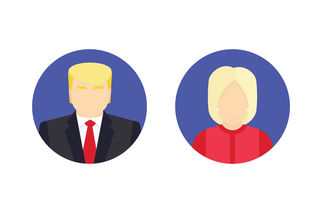I’m Right, You’re Evil
I’m Right, You’re Evil
“If freedom of speech is taken away, then dumb and silent we may be led,
like sheep to the slaughter.”
like sheep to the slaughter.”
— George Washington
If we have friends supporting the wrong candidate, we might charitably classify them as “ignorant” (unless we’ve secretly believed they were crazy all along). We can write some off as blind, knee-jerk partisans; their party’s candidate could engage in any kind of wrongdoing and they would still support him or her. (We might privately chalk that up to a special kind of stupidity.) But more and more, it seems, true believers skip the preliminaries and go straight to regarding anyone who supports the wrong candidate as just plain evil. After all, how can they possibly abide the lack of integrity, the poor judgment, the unwillingness to be transparent, etc., unless they are as bad as their candidate?

Source: created from freeimages.com strelss & thom morris
What has become clear is “the culture of listening needs repair,” as Erika Christakis, early childhood expert, wrote in a reflection on her 2015 Halloween email and the Yale firestorm that ensued. When she and her husband, sociologist and physician Nicholas Christakis, prioritized civil dialogue over ideology a year ago, nearly a thousand students, faculty, and administrators called for the Christakises to be ousted, and demanded that they apologize for their malignant ideas. These two professors were so sinister, they claimed, that for their crimes, they “should not sleep at night,” as one undergraduate decreed. Students even wanted to be warned of this evil woman’s presence in the dining hall so they could be sure not to break bread with her.
For those outside the Yale bubble who watched this drama unfold, many were completely confounded. Yale’s own website advertised, “When you encounter people who think differently than you do, you will be expected to honor their free expression, even when what they have to say seems wrong or offensive to you.” Yet not only was this not the climate in which the event unfolded, few adults at Yale defended this principle. As Christakis reveals in her commentary about that incident, many professors,
“…contacted us personally to say that it was too risky to speak their minds. Others who generously supported us publicly were admonished by colleagues for vouching for our characters. Many students met with us confidentially to describe intimidation and accusations of being a ‘race traitor’ when they deviated from the ascendant campus account…”According to the official policy of Yale College, any attempt to prevent offensive speech "rest[s] upon the assumption that speech can be suppressed by anyone who deems it false or offensive. They deny what Justice Holmes termed 'freedom for the thought that we hate.' They make the majority, or any willful minority, the arbiters of truth for all. If expression may be prevented, censored or punished, because of its content or because of the motives attributed to those who promote it, then it is no longer free."
There is a reason that “free speech and the ability to tolerate offense,” as Christakis suggested in her now infamous email, “are the hallmarks of a free and open society.” When laws are unjust, when people are treated unjustly, when groups are singled out for persecution, freedom of speech makes change possible. "Free speech," according to Yale's policy, "is a barrier to the tyranny of authoritarian or even majority opinion as to the rightness or wrongness of particular doctrines or thoughts." Regardless of the rightness or wrongness of their beliefs, when people face sanctions for speaking their minds, democracy fails. Freedom of speech is fundamental to democracy because democracy is about persuasion through engaging in civil dialogue.

Source: iStock.com © ozgurdonmaz
Sadly, the culture at Yale and other college campuses is such that listening is absent and “civility” is no longer understood to mean respectful dialogue, but is synonymous with adherence to a specific political ideology. Failing to hold the “right” views is deemed uncivil, and that kind of incivility is not to be tolerated. Only with this definition of civility can there be indignant calls for unpopular political views to be classified as “hate-speech” and silenced because they offend and provoke discomfort, anger, and fear.
Across the country, nearly one in six college students have been treated for anxiety, which is on the rise nationwide. Fear and anxiety go hand in hand. When we are estranged from classmates, colleagues, neighbors, and fellow Americans, we learn to fear them. When we fear them, not only do we view them with suspicion, we begin to believe they are dangerous, and we ultimately feel threatened by them. “It’s never easy to foster dialogue about race, class, gender and culture, but it will only become more difficult for faculty in disciplines concerned with the human condition if universities won’t declare that ideas and feelings aren’t interchangeable,” Christakis warns.
The same can be said of our electorate. Over the summer, according to a Politico article by journalist Gail Sheehy, several clients of a Boston therapist said they “felt acute anxiety just imagining that Trump could be president.” This was not an anomaly. Thousands of psychotherapists signed a manifesto claiming that Trump's candidacy is a threat to their clients’ well-being. The psychotherapists asserted (without a trace of irony) that “Trump’s campaign is legitimizing, even celebrating, a set of personal behaviors that psychotherapists work to reverse every day in their offices: ‘The tendency to blame ‘others’ in our lives for our personal fears and insecurities, and then battle these ‘others,’ instead of taking the healthier, more difficult path, of self-awareness and self-responsibility.’”

Source: Freeimages.com © Lena_Datsiuk

